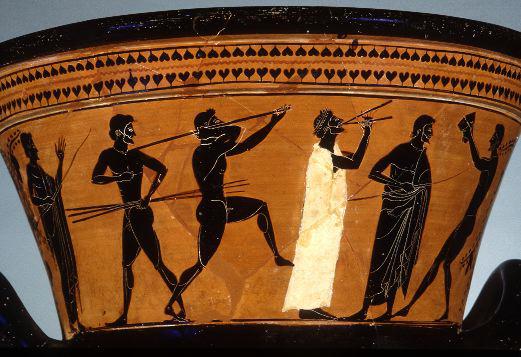





Excellence and the competitive spirit
| When the Persian military officer Tigranes "heard that the prize was not money but a crown [of olive], he could not hold his peace, but cried, 'Good heavens, Mardonius, what kind of men are these that you have pitted us against? It is not for money they contend but for glory of achievement!'" Herodotus, Histories , 8.26.3 |

Side B: Athletes and trainers
Photograph by Maria Daniels, courtesy of the Toledo Museum of Art
Ancient athletes competed as individuals, not on national teams, as in the modern Games. The emphasis on individual athletic achievement through public competition was related to the Greek ideal of excellence, called arete. Aristocratic men who attained this ideal, through their outstanding words or deeds, won permanent glory and fame. Those who failed to measure up to this code feared public shame and disgrace.
| Do you think, fellow citizens, that any man would ever have been willing to train for the pancratium or any other of the harder contests in the Olympic games...if the crown were given, not to the best man, but to the man who had successfully intrigued for it? No man would ever have been willing. But as it is, because the reward is rare...and because of the competition and the honor, and the undying fame that victory brings, men are willing to risk their bodies, and at the cost of the most severe discipline to carry the struggle to the end. Aeschines, Against Ctesiphon , 179 |
Not all athletes lived up to this code of excellence. Those who were discovered cheating were fined, and the money was used to make bronze statues of Zeus, which were erected on the road to the stadium. The statues were inscribed with messages describing the offenses, warning others not to cheat, reminding athletes that victory was won by skill and not by money, and emphasizing the Olympic spirit of piety toward the gods and fair competition.
The earliest recorded cheater was Eupolus of Thessaly, who bribed boxers in the 98th Olympiad. Callippus of Athens bought off his competitors in the pentathlon during the 112th festival. Two Egyptian boxers, Didas and Sarapammon, were fined for fixing the outcome of their match at the 226th Olympics. All these men were immortalized as cheaters in the writer Pausanias' 2nd century A.D. guidebook to Greece, in which he describes the statues at Olympia and recounts the men's misdeeds.

Side A: boxer on near right
Photograph by Maria Daniels, courtesy of the Toledo Museum of Art
To read more about these topics, see Further Resources.
- The Greek city-states and the religious festival
- Excellence and the competitive spirit
- The Olympic truce
- The ancient athlete: amateur or professional?
- Did politics ever affect the ancient Games?
- Spectators at the Games
- Cultural achievements and the Games
This exhibit is a subset of materials from the Perseus Project database and is copyrighted. Please send us your comments.